- Home
- James Hadley Chase
Shock Treatment Page 8
Shock Treatment Read online
Page 8
Macklin was around thirty-eight: a short, compact man with a lean, alert face and shrewd dark eyes.
As he shook hands with me, he said, “This shouldn’t take long. I’ve talked to the Coroner. He’s not going to call Mrs Delaney.”
This was good news. I had been scared that Stringer might have questioned Gilda, and she might have given something away.
At eleven o’clock, Sheriff Jefferson and Doc Mallard came in. They shook hands with Gilda, nodded to Macklin and to me and sat down.
Joe Stringer, the Coroner, came in and sat behind the table in the middle of the room.
Stringer was a fat little man, nudging seventy, full of importance and without much intelligence. He opened the proceedings, and then Sheriff Jefferson gave evidence of how he had found Delaney lying before die TV set, dead.
He told Stringer that he was satisfied that there was no suspicion of foul play and that Doc Mallard would confirm this. Stringer then called Doc Mallard.
Doc sat in the witness chair and enjoyed himself.
He said Delaney had died from a severe electric shock, and he was satisfied that the cause of death was an accident.
He pointed out that Delaney had been in an all-steel chair and had used an all-steel screwdriver. Under these circumstances, he went on, if the screwdriver came into contact with a live terminal or wire, the shock would be great enough to kill the healthiest man.
Joe chewed his pen, looked wise and made a few notes. He thanked Doc and then called me.
His first words to me told me I was three-quarters home.
“Would you tell us, Mr Regan, how the accident could have happened?”
Already he was talking of an accident. It now depended on what I said to tip the scales.
I went over to Stringer’s desk and drew him a plan of the set, explaining to him how the sound control lead had come adrift, and how it was possible to get a shock by poking an uninsulated screwdriver into the set, touching one terminal, and then another. I also explained how anxious Delaney had been to see the Dempsey fight film.
“It’s happening all the time, Mr Coroner,” I concluded. “People just don’t realize the danger when they fool around with a TV set when the current’s going through it. The fact that he was in an all-metal chair, and using a screwdriver that wasn’t insulated, didn’t give him a chance.”
The blueprint I had drawn clinched it. It was something Stringer could look at and understand. I could see he was convinced as he thanked me for making it so clear, and when I got back to my seat, he looked over at George Macklin and asked him if he wanted to say anything. Macklin said he didn’t, and that fixed it.
Stringer said he found Delaney had died through an unfortunate accident and he had no hesitation in recording a verdict of accidental death.
After he had gone through a long harangue about the dangers of ignorant people meddling with TV and radio sets, he left his table and came over to Gilda and offered her his condolences.
Sheriff Jefferson, Doc Mallard, Macklin and I followed Gilda out of the hall and we all paused outside in the hot sunshine.
“If there’s anything I can do, Mrs Delaney,” Jefferson said, “just let me know. I’ll be happy to do it.”
Gilda thanked him. She said Macklin would take care of everything.
Macklin told her he would be out at Blue Jay cabin the following afternoon, and he would let her know how the financial situation was by then. He shook hands with her and with me, and then he, Jefferson and Doc Mallard went off together.
That left Gilda and me alone.
I was feeling fine now. Fear had left me. It had come out just the way I had planned it to come out.
“We’re nearly through,” I said. “It went off better than I thought it would. Is there anything I can do? Anything I can take care of for you?”
“There’s the TV set, Terry. He — he never paid for it, did he? I wish you would take it away.”
“That’s okay,” I said. “I’ll come out and take it away the day after tomorrow. Nothing else?”
She shook her head.
“Mr Macklin will take care of everything.”
Neither of us looked at each other as we talked. I was aware that we were in the main street and I was nervous people might be curious about us.
“What do you plan to do now, Gilda?”
“I don’t know. It’s what you plan to do. You tell me.”
“We’ll have to keep away from each other for a month. I think you had better go to a hotel in Los Angeles. At the end of a month, I’ll have cleared up my business here, then I’ll join you. We’ll go somewhere — New York or somewhere, and make a fresh start. I’ll open this shop. When you are fixed up in Los Angeles, write to me. Don’t telephone.”
“Then I’ll see you the day after tomorrow.”
“Yes. We’ll talk more then.”
I watched her walk over to where she had parked the Buick, then I started across the street to where I had left my truck. I hated her going back to the cabin on her own, but I knew I couldn’t afford to take any risks of starting gossip.
It was hot, and I took my handkerchief out to wipe my face and I felt some papers in my pocket. I pulled out the two letters Hank Fletcher had given me for Delaney and I stared blankly at them. I had forgotten about them.
Gilda was getting into the Buick. I ran over to her.
“I forgot to give you these letters,” I said. “They were delivered yesterday.”
She glanced at them, then pushed them into her bag.
“Thank you.”
We looked at each other. Those forget-me-not blue eyes were clouded and expressionless. They worried me a little.
I watched her drive away.
After all, a month wasn’t all that long to wait, and then a new and exciting life was ahead of us.
III
I went out to Blue Jay cabin, as I had promised, to collect the TV set.
As I got off the truck, Gilda came out onto the verandah. She was wearing her cowboy shirt and jeans. She looked pale, and there were smudges under her eyes as if she hadn’t slept much during the night. “Gilda!”
I ran up the steps and took her in my arms. Her hands pressed against my chest, keeping me away from her. “Not here, Terry!”
From the way she looked at me, I knew something was wrong. I let go of her.
“What is it, Gilda?”
She moved away from me and sat down.
“I want to talk to you.”
I sat down. I was suddenly frightened.
“Terry . . . I have some bad news.”
“Well, all right.” My voice sounded husky. What is it?”
“There’s no money.”
I stared at her. That was the last thing I expected to hear.
“No money?”
“Mr Macklin was here yesterday. He thought I knew. Jack had been spending his money recklessly ever since he was crippled. Mr Macklin kept warning him, but he wouldn’t listen. The rent of this place was ridiculous. It seems he never had very much, although he told me he had. I can’t think why. The money he left won’t even cover his debts. I’m sorry, Terry, but there it is.”
It was a pretty hard jolt. I had been counting on Delaney’s money to make a fresh start.
“I want you to understand, Terry,” she went on quietly, “that I don’t expect you to marry me now. I have nothing to offer you. I realize you wouldn’t want to be hampered by a wife unless you had capital to make a fresh start. I think it would be better to forget about me.”
“Oh, no,” I said. “Now look, Gilda, I love you. We can fix something. I want to marry you, and I’m going to marry you. It means we’ll have to wait a little longer, that’s all. We can’t get married here. There would be too much talk and gossip. It’ll mean I’ll have to work for a firm again. I don’t mind that, but we may have a tough time to start with. If you can stand it, I can.”
She hunched her shoulders, frowning.
“You don’t have t
o do this, Terry. I can look after myself.”
I got up and knelt at her side, taking her hands in mine.
“I want you, darling. Maybe it’s better this way. It bothered me, thinking I would use his money. If you’ll take a chance with me, I’ll make good.”
She began to cry, turning her head away from me.
It was a let-down all right, but at least I had her, and she had been the real reason why I had killed Delaney.
When she had got over her crying jag and had calmed down, she said: “I keep wondering if he killed himself. I keep wondering if it was an accident. Do you think he deliberately did this thing to provide for his debts?”
I was only half listening to what she was saying, but her last words registered and I looked sharply at her.
“Provide for his debts — what do you mean?”
“There’s this insurance policy he took out.”
I stiffened. My heart began to thump.
“Insurance policy? What policy?”
“I haven’t had time to tell you. He was insured. Mr Macklin told me yesterday. I didn’t know myself. One of the letters you gave me was the policy from the Insurance people. He had insured the TV set. Mr Macklin says there’s a clause in the policy that covers the owner of the set against an accident. He says he is sure he can collect on the policy. It’ll be worth five thousand dollars. It’ll clear Jack’s debts and give me a little something in hand until I find a job.”
If she had struck me in the face I couldn’t have been more taken aback. I felt my heart turn over and my stomach muscles cramp up.
“I didn’t know he had insured the set,” I said and my voice sounded far away.
“After you delivered the set,” Gilda said, “a young man called on us. I think he said his name was Lawson. He saw the set and persuaded Jack to insure it.”
I remembered then that Delaney’s name had been on the list I had lent Lawson.
“But that was only for the set. Your husband wasn’t insured against an accident, was he?”
“Yes, apparently. That’s what Mr Macklin tells me. He says the owner of the set is covered against an accident.”
I felt suddenly as cold as ice.
“For five thousand dollars?”
“Yes.”
My whole world began to crumble. Fear took hold of me in a grip that paralysed.
This would mean an investigation. I knew enough about insurance companies to be sure they wouldn’t accept Delaney’s death the way Jefferson and Doc Mallard had accepted it. They wouldn’t part with a dime let alone five thousand dollars without making absolutely sure they had to pay out.
My plan and my life could now be in jeopardy because of this unexpected policy.
“There could be an investigation, Gilda,” I said. “Is it worth bothering about? Perhaps it would be better not to put in the claim.”
She looked sharply at me.
“But it’s five thousand dollars! There are bills due for three thousand. Of course I must claim.”
“These insurance detectives probe pretty deep,” I said, trying not to let her see how scared I was. “They might easily find out about you and me, Gilda.”
“How can they? All they will want is the record of the inquest and the death certificate. That’s what Mr Macklin says. They can’t avoid paying up.”
“Don’t be too sure about that. I’ve heard what some of these insurance companies are like. They’ll use any excuse not to pay out. They might even try to prove he did commit suicide. They wouldn’t have to pay out then. All they would need is one good reason to show he had killed himself, and they couldn’t have a better one if they found out he had no money and you and I were lovers and you were leaving him.”
“You’re exaggerating!”
“I’m not!” I couldn’t keep my voice down. “If they get the slightest suspicion that you and I had been lovers, they’d tear into us like a pack of wolves! Make no mistake about that! I’m not saying they’d get away with it, but they could force you to fight the claim in court. They’d stick some smart attorney onto you who’d worm the whole story out of you, and they’d get me in court too. We’d be smeared across the front page of every newspaper in the district, and we’d be cooked!”
She was looking at me now as if she thought I was crazy.
“You’re frightening me. What is it? Do you know more about this thing than you’ve told me?”
“Of course not. I’m just warning you what could happen. Can’t we stop this claim?”
“I can ask Mr Macklin. I think it’s already gone through. He said he would deal with it as soon as he got back to his office. Do you want me to telephone him?”
I hesitated. If Macklin had lodged the claim it would be fatal to attempt to cancel it. It would bring the spotlight of suspicion right on us.
“No,” I said. “Let it go. Perhaps it doesn’t matter. Perhaps as you say, they won’t make trouble.”
“Are you sure you have told me everything you know about Jack’s death?” she asked. “You’re worrying me. You make me feel somehow guilty.”
“To the people living around here, you and I are guilty,” I said, not looking at her. “We’re guilty of loving each other. Now look, Gilda, I must keep away from you until this claim is settled. There can be no question of us meeting in Los Angeles now. Do you understand? The chances are once the claim is lodged their detectives will watch you. If they see us together, they could easily jump to conclusions.”
“But, darling, I really don’t understand this,” Gilda said, a note of impatience in her voice. “What have we got to be afraid of?”
“I’m trying to save you getting your name in the papers. This insurance company could use our love for each other to contest the claim.”
She spread her hands helplessly.
“Well, all right. I can’t believe it, but if you feel that way, there’s nothing I can do about it. You don’t want to come near me until after the claim is settled, is that it?”
“Yes. I’m sorry, Gilda, but it is important.” I got to my feet. “You may not think so now, but if these people find out about us, you’ll realize fast enough I’ve been talking sense.” I moved away from her. “I’d better collect the set and get away from here. Someone might come and find us here together.”
“Mr Macklin said the set was to be left until the insurance people had examined it.”
That gave me another bad jolt.
“Yes — I was forgetting. Well, all right. Now, look, Gilda, as soon as you have found a hotel in Los Angeles, write to me. I don’t trust the girl on the switchboard. She’s always listening in. I’ll keep in touch with you by letter, but we must keep clear of each other.”
“All right, Terry.”
I said good-bye to her. I was so scared I forgot to kiss her.
CHAPTER VI
I
NOTHING happened for four days.
The days weren’t so bad because I was busy, but the nights were really something.
On the fifth morning I got a letter from Gilda.
She was now in Los Angeles, she wrote, staying in a rooming house, and she was looking for a job without success so far. She said the insurance company was in contact with Macklin and they were sending out a representative to look at the set. The representative would arrive on Saturday morning — that was tomorrow — and would I be at Blue Jay cabin at eleven o’clock to show him the set? She said she had left the key of the cabin under the mat.
I was at Blue Jay cabin the following morning at eleven sharp.
A couple of minutes later, I heard a car coming, and I went out onto the verandah. My heart was thumping uneasily, the back of my mouth was dry and I had a cold empty sensation in my stomach.
A sleek Packard convertible drifted up the drive and came to rest by my truck.
At the wheel was a broad-shouldered, dark man around thirty-two or three with a deeply tanned, ugly but humorous face. He got out of the car as if the effect was too much for h
im. He sauntered up the verandah steps.
“Are you Mr Regan?”
“Yes.”
He held out his hand.
“Glad to know you, Mr Regan. I’m Steve Harmas of the National Fidelity. You know about this business? Mrs Delaney’s attorney said you would show me the set that caused the accident.”
Well, at least he was calling it an accident.
I led him into the lounge.
“That’s it,” I said, nodding to where the set stood.
He glanced at the set indifferently, then sat down, waving me to a chair.
“This claim has caused a lot of writhing in our snake-pit,” he said. “There’s an uproar going on that you could hear from here if you listened that carefully.”
I said, “Why? What’s the uproar about?”
“Our claims department is run by a guy named Maddox,” Harmas said. “He has a hornet in his chapeau. Whenever a claim comes in, he examines it the way you would examine an egg that has been laid a couple of years ago. He doesn’t even wait to break the shell to be convinced it’s bad. Every claim we get is treated the same way. During the year, we have something like twenty to thirty thousand claims. Two per cent, probably less, are wrong ‘uns, and Maddox has found them to be wrong long before any of our super dicks have had a chance to investigate. He works by instinct, and up to now he’s been right every time.” He looked sleepily at me and grinned. “Come the day when he’s wrong! Boy! Won’t I cram it down his throat!”
I sat there, listening, keeping my face expressionless.
“This claim,” Harmas went on. “Maddox thinks it’s a wrong “un. I have orders to check on it.”
What’s wrong with the claim then?” I asked.
“The way Maddox figures it is this: since we started to sell coverage for TV sets we have issued some twenty thousand policies. Our records show that during that period we have never had to pay out on the personal accident clause.” He grinned. “Between you and me, the boys who work out the risks on this particular coverage have put that clause in about personal risk to catch a sale. We don’t reckon to pay out on it.”

 Come Easy, Go Easy
Come Easy, Go Easy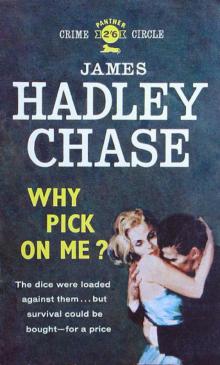 Why Pick On ME?
Why Pick On ME?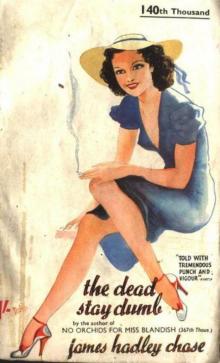 The Dead Stay Dumb
The Dead Stay Dumb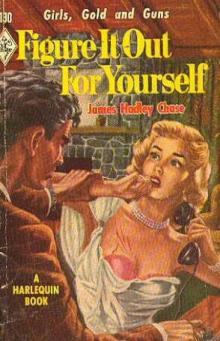 Figure it Out For Yourself
Figure it Out For Yourself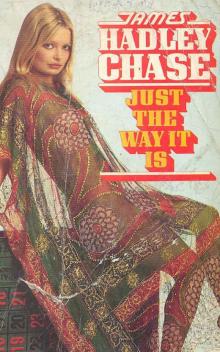 1944 - Just the Way It Is
1944 - Just the Way It Is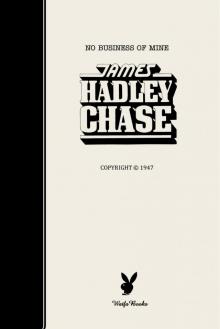 No Business Of Mine
No Business Of Mine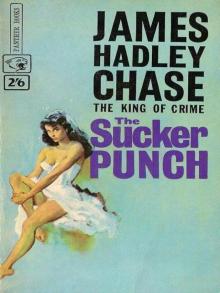 1953 - The Sucker Punch
1953 - The Sucker Punch Cade
Cade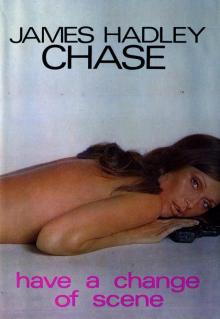 1973 - Have a Change of Scene
1973 - Have a Change of Scene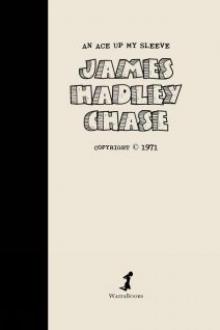 An Ace up my Sleeve
An Ace up my Sleeve 1968-An Ear to the Ground
1968-An Ear to the Ground 1950 - Figure it Out for Yourself
1950 - Figure it Out for Yourself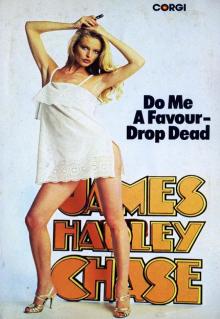 1976 - Do Me a Favour Drop Dead
1976 - Do Me a Favour Drop Dead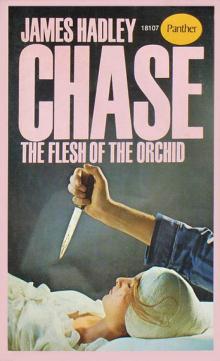 The Flesh of The Orchid
The Flesh of The Orchid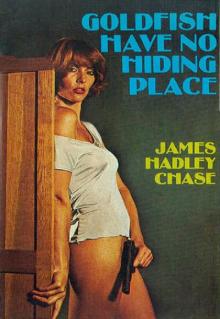 1974 - Goldfish Have No Hiding Place
1974 - Goldfish Have No Hiding Place Whiff of Money
Whiff of Money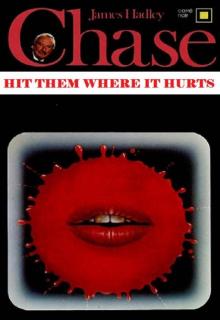 1984 - Hit Them Where it Hurts
1984 - Hit Them Where it Hurts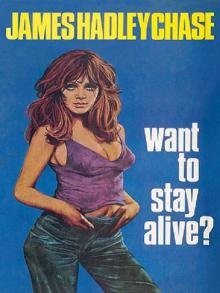 1971 - Want to Stay Alive
1971 - Want to Stay Alive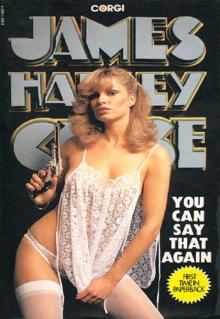 1980 - You Can Say That Again
1980 - You Can Say That Again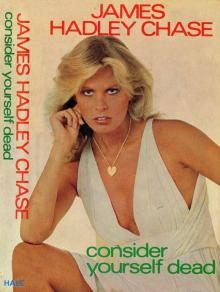 1978 - Consider Yourself Dead
1978 - Consider Yourself Dead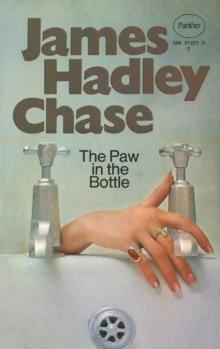 The Paw in The Bottle
The Paw in The Bottle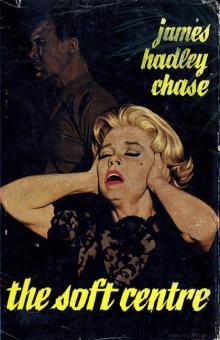 Soft Centre
Soft Centre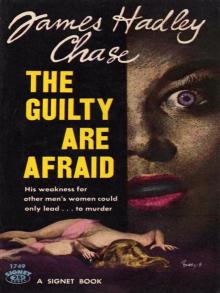 The Guilty Are Afraid
The Guilty Are Afraid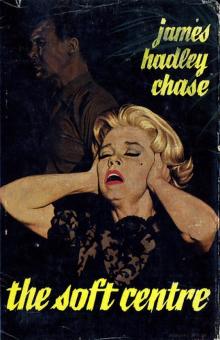 The Soft Centre
The Soft Centre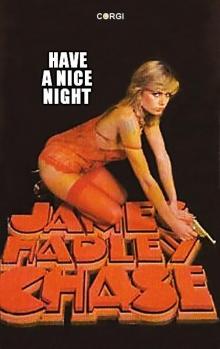 Have a Nice Night
Have a Nice Night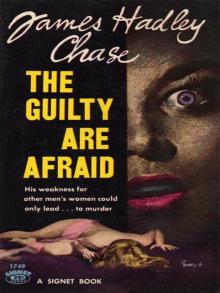 1957 - The Guilty Are Afraid
1957 - The Guilty Are Afraid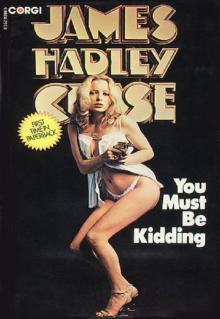 1979 - You Must Be Kidding
1979 - You Must Be Kidding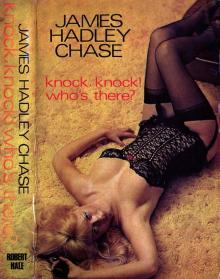 Knock, Knock! Who's There?
Knock, Knock! Who's There?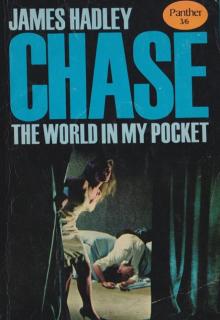 1958 - The World in My Pocket
1958 - The World in My Pocket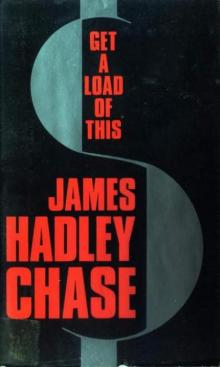 Get a Load of This
Get a Load of This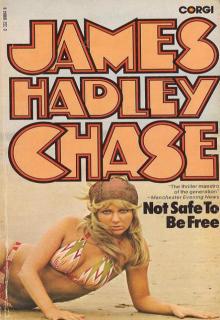 1958 - Not Safe to be Free
1958 - Not Safe to be Free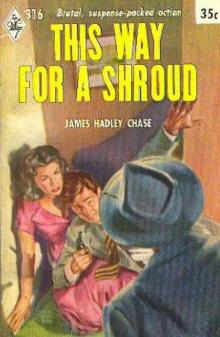 This Way for a Shroud
This Way for a Shroud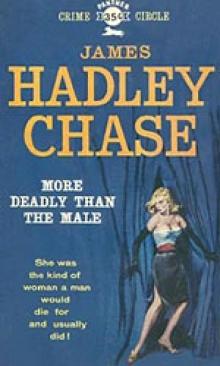 More Deadly Than the Male
More Deadly Than the Male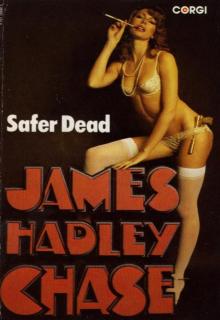 Safer Dead
Safer Dead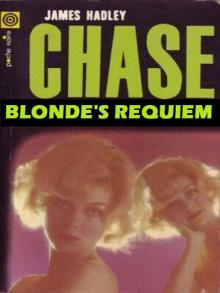 1945 - Blonde's Requiem
1945 - Blonde's Requiem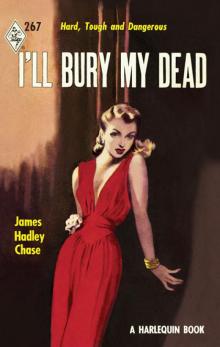 I'll Bury My Dead
I'll Bury My Dead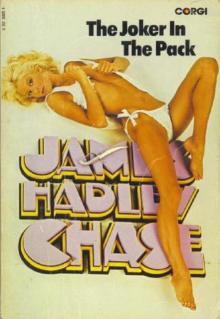 1975 - The Joker in the Pack
1975 - The Joker in the Pack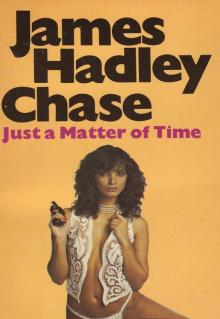 1972 - Just a Matter of Time
1972 - Just a Matter of Time 1954 - Mission to Venice
1954 - Mission to Venice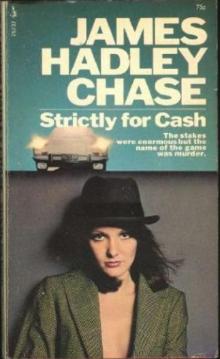 Strictly for Cash
Strictly for Cash A COFFIN FROM HONG KONG
A COFFIN FROM HONG KONG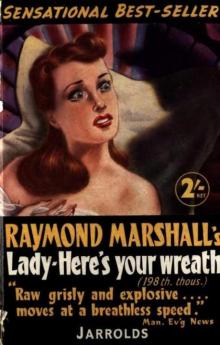 Lady—Here's Your Wreath
Lady—Here's Your Wreath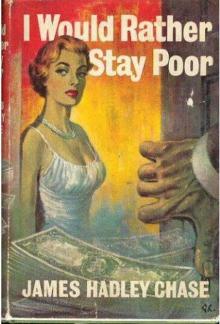 I Would Rather Stay Poor
I Would Rather Stay Poor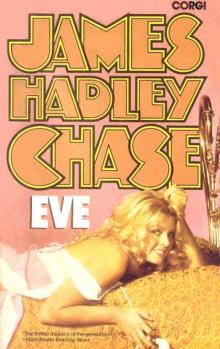 Eve
Eve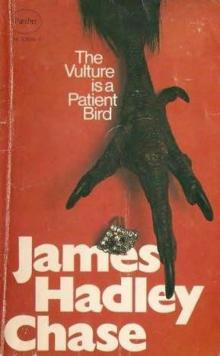 Vulture Is a Patient Bird
Vulture Is a Patient Bird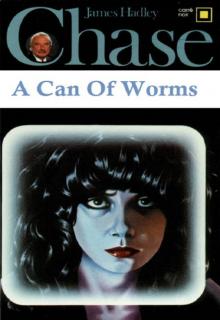 1979 - A Can of Worms
1979 - A Can of Worms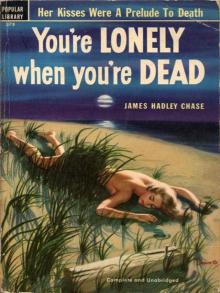 1949 - You're Lonely When You Dead
1949 - You're Lonely When You Dead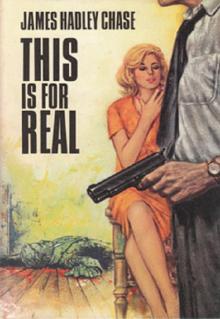 1965 - This is for Real
1965 - This is for Real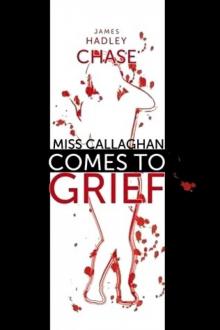 (1941) Miss Callaghan Comes To Grief
(1941) Miss Callaghan Comes To Grief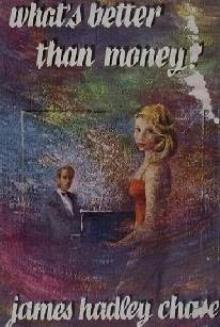 What`s Better Than Money
What`s Better Than Money This is For Real
This is For Real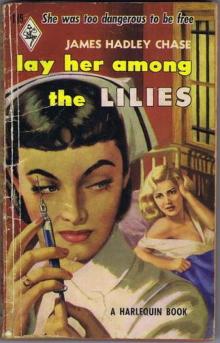 Lay Her Among the Lilies vm-2
Lay Her Among the Lilies vm-2 Knock Knock Whos There
Knock Knock Whos There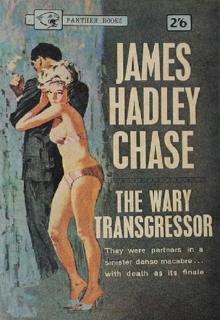 1952 - The Wary Transgressor
1952 - The Wary Transgressor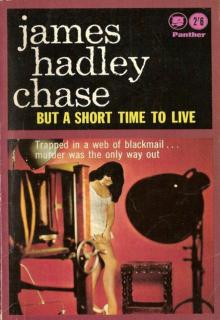 1951 - But a Short Time to Live
1951 - But a Short Time to Live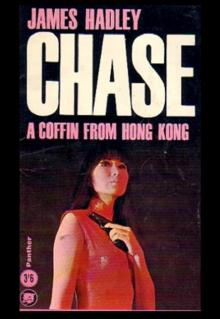 1962 - A Coffin From Hong Kong
1962 - A Coffin From Hong Kong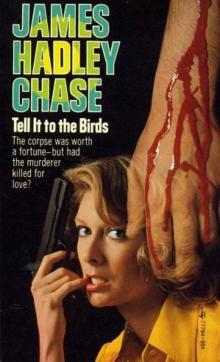 Tell It to the Birds
Tell It to the Birds Well Now, My Pretty…
Well Now, My Pretty…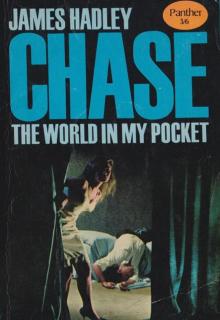 The World in My Pocket
The World in My Pocket A Lotus for Miss Quon
A Lotus for Miss Quon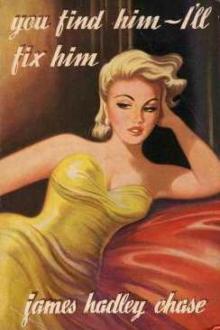 You Find Him, I'll Fix Him
You Find Him, I'll Fix Him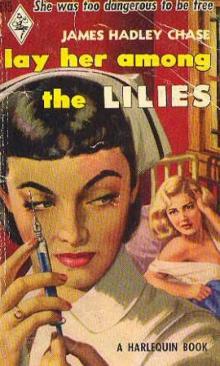 Lay Her Among The Lilies
Lay Her Among The Lilies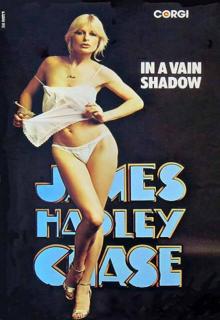 1951 - In a Vain Shadow
1951 - In a Vain Shadow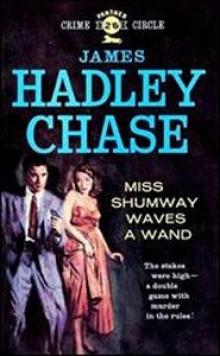 Miss Shumway Waves a Wand
Miss Shumway Waves a Wand 1953 - This Way for a Shroud
1953 - This Way for a Shroud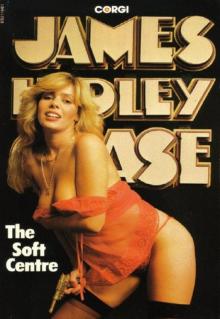 1964 - The Soft Centre
1964 - The Soft Centre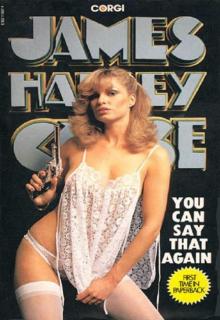 You Can Say That Again
You Can Say That Again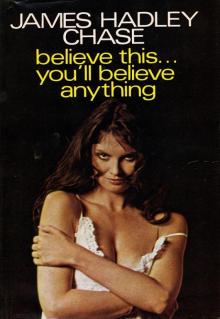 1975 - Believe This You'll Believe Anything
1975 - Believe This You'll Believe Anything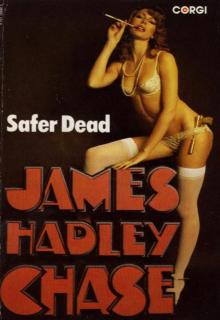 1954 - Safer Dead
1954 - Safer Dead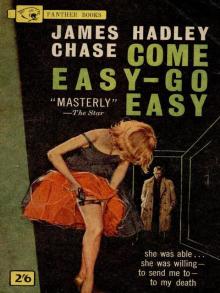 1960 - Come Easy, Go Easy
1960 - Come Easy, Go Easy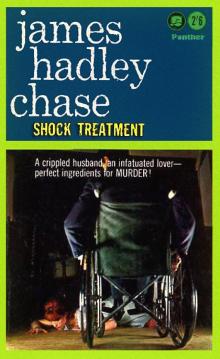 Shock Treatment
Shock Treatment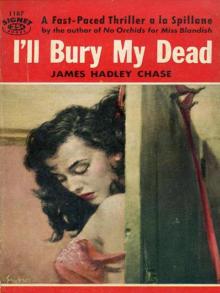 1953 - I'll Bury My Dead
1953 - I'll Bury My Dead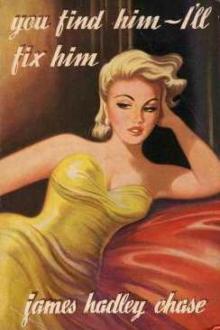 You Find Him – I'll Fix Him
You Find Him – I'll Fix Him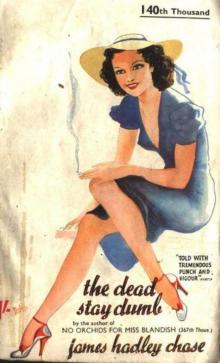 Dead Stay Dumb
Dead Stay Dumb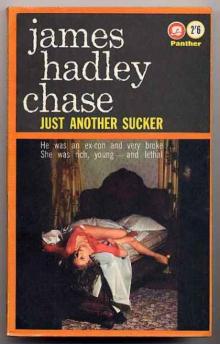 Just Another Sucker
Just Another Sucker Well Now My Pretty
Well Now My Pretty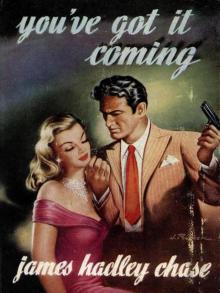 You've Got It Coming
You've Got It Coming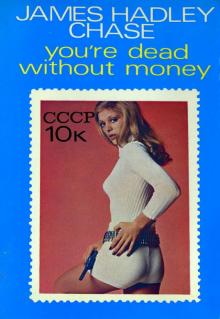 1972 - You're Dead Without Money
1972 - You're Dead Without Money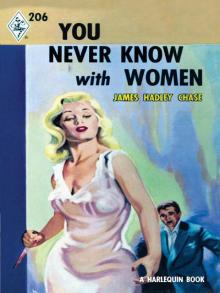 1955 - You Never Know With Women
1955 - You Never Know With Women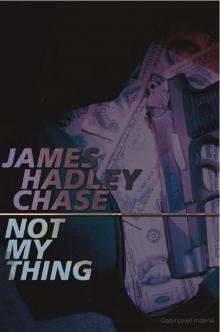 Not My Thing
Not My Thing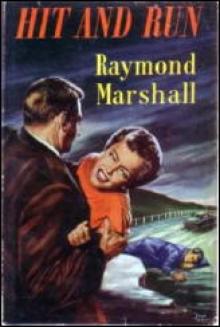 Hit and Run
Hit and Run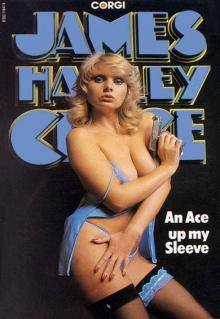 1971 - An Ace Up My Sleeve
1971 - An Ace Up My Sleeve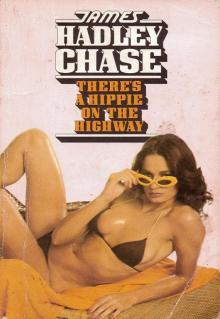 1970 - There's a Hippie on the Highway
1970 - There's a Hippie on the Highway 1968 - An Ear to the Ground
1968 - An Ear to the Ground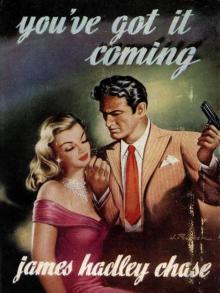 1955 - You've Got It Coming
1955 - You've Got It Coming 1963 - One Bright Summer Morning
1963 - One Bright Summer Morning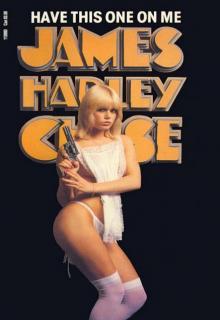 1967 - Have This One on Me
1967 - Have This One on Me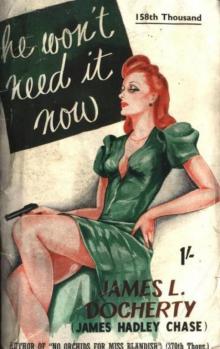 He Won't Need It Now
He Won't Need It Now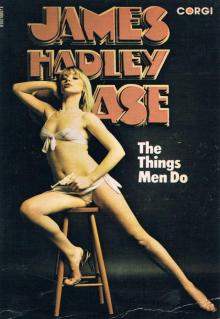 1953 - The Things Men Do
1953 - The Things Men Do Believed Violent
Believed Violent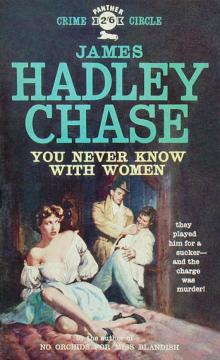 You Never Know With Women
You Never Know With Women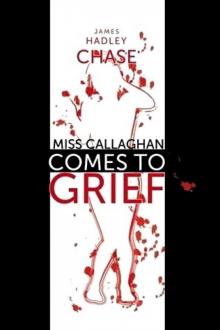 Miss Callaghan Comes to Grief
Miss Callaghan Comes to Grief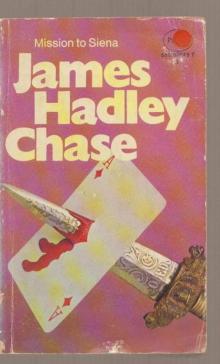 Mission to Siena
Mission to Siena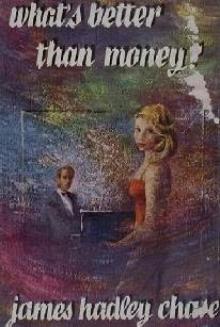 What's Better Than Money
What's Better Than Money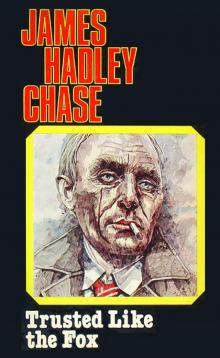 Trusted Like The Fox
Trusted Like The Fox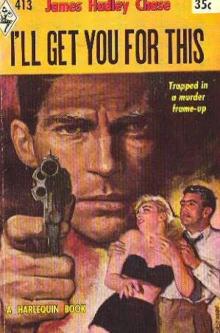 I'll Get You for This
I'll Get You for This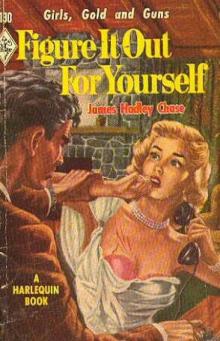 Figure It Out for Yourself vm-3
Figure It Out for Yourself vm-3 Like a Hole in the Head
Like a Hole in the Head 1977 - I Hold the Four Aces
1977 - I Hold the Four Aces 1969 - The Whiff of Money
1969 - The Whiff of Money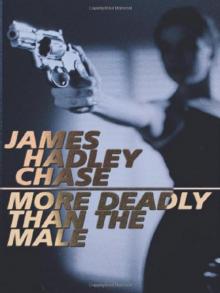 1946 - More Deadly than the Male
1946 - More Deadly than the Male 1956 - There's Always a Price Tag
1956 - There's Always a Price Tag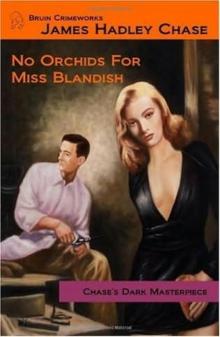 No Orchids for Miss Blandish
No Orchids for Miss Blandish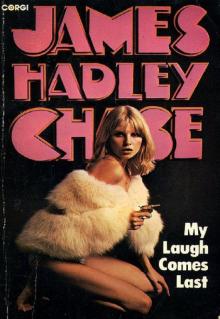 1977 - My Laugh Comes Last
1977 - My Laugh Comes Last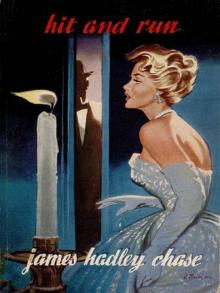 1958 - Hit and Run
1958 - Hit and Run 1981 - Hand Me a Fig Leaf
1981 - Hand Me a Fig Leaf 1966 - You Have Yourself a Deal
1966 - You Have Yourself a Deal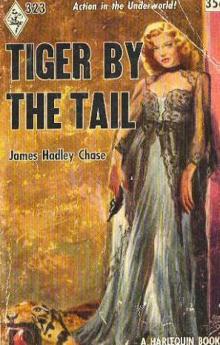 Tiger by the Tail
Tiger by the Tail